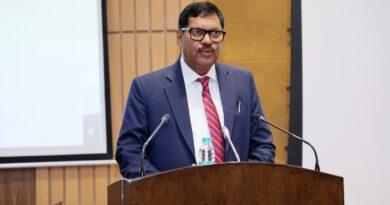Armed Conflict Puts Human Rights of People with Disabilities and All Civilians in Peril: UN Experts
(Special Correspondent)
GENEVA (1 December 2023) – Many people with disabilities have lost their lives to armed conflict, UN experts* said today, calling for peace at a time when the human rights of persons with disabilities and all civilians are in peril. Ahead of the International Day of Persons with Disabilities, they issued the following statement:
“This year, we remember that persons with disabilities are the most and first to be harmed in armed conflicts. Armed conflicts have particularly severe and long-lasting effects on people with disabilities as they result in the destruction of critical infrastructure, support services and networks.
This year we raise the slogan “United in action to rescue and achieve the SDGs for, with and by persons with disabilities”. Seventy-five years after the adoption of the Universal Declaration of Human Rights, armed conflicts remain one of the biggest obstacles to the implementation of Sustainable Development Goals. Hence, the importance of Goal 16 to promote peaceful and inclusive societies is clear.
This also means that we must include the rights and needs of persons with disabilities in post-conflict reconstruction.
According to a human rights watch report Submission to the UN Special Rapporteur on the Rights of Persons with Disabilities regarding Persons with Disabilities in the Context of Armed Conflict it is submitted that “Situations of armed conflict often force people to flee areas when violence erupts. Persons with disabilities can be at higher risk of harm during fighting. Human Rights Watch research in Cameroon, Central African Republic, Israel/Palestine, Syria, and South Sudan found that persons with disabilities faced several difficulties fleeing armed attacks on their communities. Persons with physical disabilities may struggle to flee and seek shelter without assistance and access to assistive devices. For example, during Israel’s military offensive in Gaza in 2014, a 26-year-old woman with a physical disability was unable to flee with the rest of her family when a missile struck her house.2 She was wounded in the leg and her mobility scooter was destroyed. She managed to flee to safety only when a relative returned to help her.”
People with disabilities, including persons with albinism and persons affected by leprosy with disabilities related, must have equal opportunities to benefit from Sustainable Development Goals. So far, sustainable development plans have not succeeded in fully including persons with disabilities and they are still “left behind”. Joint work and meaningful participation of persons with disabilities is necessary to ensure the implementation of the 2030 Sustainable Development Agenda effectively addresses concerns of persons with disabilities.
Persons with disabilities and their rights must also be included in discussions reviewing the progress made in implementing the Sustainable Development Agenda.
Following the 2023 SDG Summit and its Political Declaration, a key moment to rethink how the rights of persons with disabilities are effectively mainstreamed is the 2024 Summit for the Future and its outcome document the Pact for the Future, as well as any annexes. This process is presenting States with a crucial opportunity to commit to concrete actions that will make societies more accessible and inclusive.
The Convention on the Rights of Persons with Disabilities contains clear legal obligations that apply to States when implementing the Sustainable Development Agenda. It provides guidance on how to meet the SDGs while mainstreaming disability issues as an integral part of relevant strategies to ensure persons with disabilities are not left behind. We call on States to do so in all goals, objectives and indicators when planning the post-2030 development agenda and in accelerating the implementation of the current goals.




